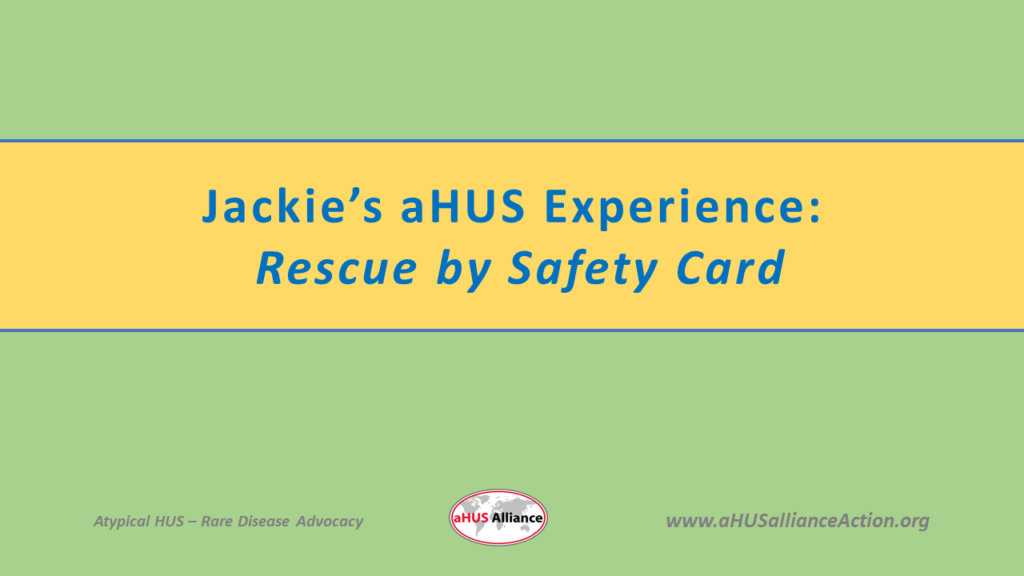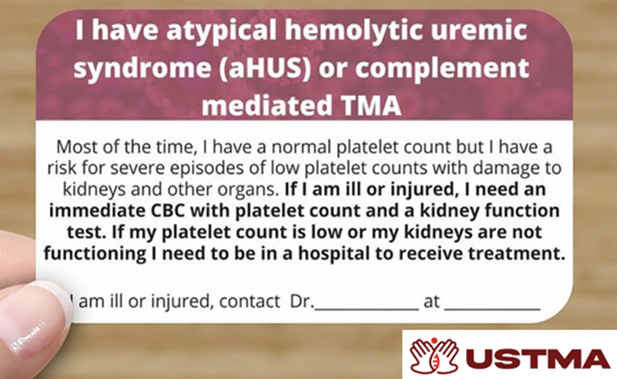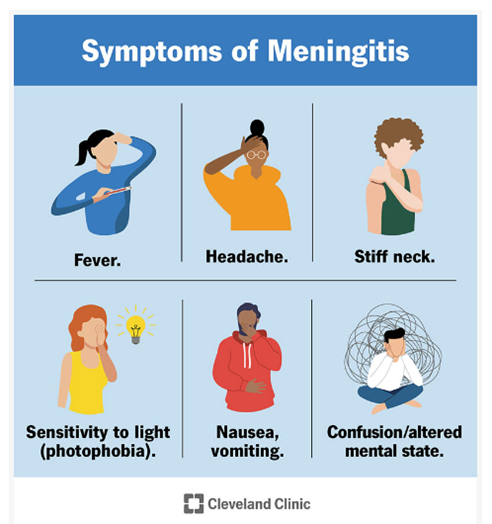
This article underscores for the aHUS community members the importance of keeping informed, being prepared, and being vigilant for changes in health. People diagnosed with atypical HUS and being treated with eculizumab or ravulizumab (trademarked respectively as Soliris ® and Ultomiris ®) are informed that these safe and effective treatments for their rare condition can lower the immune system’s ability to fight infections. Complement inhibitors such as these therapeutic drugs put patients at increased risk for meningococcal infection, which can be life-threatening or fatal if not recognized and treated early.
Before being treated with a complement inhibitor, patients are vaccinated against meningococcal infection (both Men A & Men B) but vaccines and their booster doses do not prevent all meningococcal infections. Patients and their medical providers should be alert for infections caused by Neisseria species other than Neisseria meningitidis, as well as infections caused by encapsulated bacteria, such as Streptococcus pneumoniae and Haemophilus influenzae.
Featured here is how one aHUS patient’s experience illuminates the importance of understanding your health status and carrying a Patient Safety card to display in urgent care emergencies. Within this article Jackie refers to medical cards she carries, and highlights how information on the Patient Safety Card provided by Alexion Pharmaceuticals made such a difference during her recent medical emergency.
We applaud and appreciate Jackie’s willingness to reach out to others in the aHUS community by sharing her experience.
I’m sharing my story to help raise awareness, hoping my experience can help someone else.
I have atypical HUS, but also am diagnosed with systemic Lupus Nephritis, and polymyositis. I’ve had a kidney transplant which is going into its 2nd year in July. Due to my various medical conditions, I have a medical folder which is kept handy in case of emergencies and this contains my surgical history, medications list, doctors’ contact information, and other important details. My husband knows to always grab this medical folder along with my wallet.
I keep one special slot in my wallet for ‘medical cards’, which my husband makes sure to provide to all the necessary people when events call for specific information. That dedicated slot in my wallet includes my health insurance card, prescription card, card from The aHUS Foundation (noting my aHUS diagnosis and which labs to draw). Since I’m taking ravulizumab, I carry an Ultomiris ® Patient Safety Card. I heard how important it is to be vigilant for signs of meningitis when taking a complement inhibitor drug, and I thought I was well informed, but things took an unexpected turn for the worse on the 25th of April this year.
It was just after midnight. I was fasting for a procedure the following morning, but I woke up with my lower back aching. Since in the past I’d had problems with sciatica, I brushed it off and thought no more of it. But as the night went on things only proceeded to get worse. The pain got so severe that my husband called Emergency Medical Services (EMS) which came and took me to the emergency room (ER) at our local hospital. By this point the pain was severe and there were multiple symptoms: vomiting, a slight fever, and I was shaking all over. The medical team in the ER treated the sciatica and sent me home. However, that was far from the end of my story.
Hospital staff telephoned the next evening to inform me that I needed to return for a blood draw and repeat labs. The caller would not tell me about their concern with my initial blood work, just that the hospital needed to repeat the labs previously drawn. It turned out that my slight fever was the first sign that I was beginning to go septic, with an extreme response to infection. I’d been called back to the hospital because bacterial Neisseria meningitides cultures had been found in my blood.
I’d gone to the hospital for what seemed like a completely unrelated issue. If my husband hadn’t given the doctors and nurses my cards in the ER, matters could have quickly developed into a situation that could have once again left me fighting for my life. Please, no matter how insignificant or irrelevant symptoms may seem, my experience is a perfect example of why those cards should be used and carried with you at all times!
We appreciate Jackie sharing her experience with bacterial meningitis, and her advocacy in helping other aHUS patients better understand the importance of carrying and displaying the Patient Safety card which is provided to those treated with a complement inhibitor.
Not on treatment with a complement inhibitor, but interested in the concept of an aHUS medical card to carry? The USTMA Consortium, offers a free multi-purpose aHUS Patient Safety Card, and is not specific to treatment or location (The USTMA team offers 15 locations in the USA, and collaborates internationally as well.)

View or Request this card HERE
About Meningitis: In the general population, meningitis most often is caused by a viral infection but it can also be bacterial or fungal or parasitic causes. This inflammation and infection affects fluid and membranes (meninges) that surround and protect the brain and spinal cord, and may cause serious impacts such as deafness, limb loss, or even death.

For details regarding this image from the Cleveland Clinic, click HERE to learn more about Meningitis
FMI & articles about Atypical HUS and Meningitis, we invite you to Learn More
aHUS meningococcal infection – Vigilance is Essential
Meningococcal Infection – Symptoms

